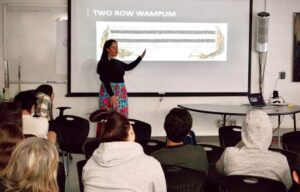Biigtigong Nishnaabeg lawyer talks treaties during Treaties Recognition Week

By Rick Garrick
THUNDER BAY — Biigtigong Nishnaabeg’s Nicole Richmond recently delivered presentations on the history of treaties and treaty relationships during Treaties Recognition Week at three Lakehead District School Board (LDSB) high schools in Thunder Bay.
“I didn’t want to get so much into the technical details about the treaties, but more to talk about the spirit and intent of what’s underneath the treaties and what the Anishinaabe values are,” says Richmond, lawyer, wellness consultant and educator, during her presentation at Westgate Collegiate and Vocational Institute on Nov. 7. “So, I talked about Anishinabek relationship with the Manitous and the star nations, I talked a little bit about our creation stories and our cosmology as well as our relationship with the animals and the Earth to talk about the core things that Anishinaabe people would have been protecting or would have been thinking about when they were entering into the treaties.”
Richmond also highlighted the Robinson Huron Treaty annuities case, for which the Robinson Huron Treaty Litigation Fund and the federal and provincial governments announced a proposed settlement of $10 billion for past compensation on June 17.
“What’s really cool about that case is at the first level [Justice] Hennessy delivered her decision, she actually talked about Anishinaabe legal principles in rendering her decision,” Richmond says. “When she’s talking about the spirit and intent and the meaning of the treaty and the common intention of the parties, she takes into consideration Anishinaabe law, so what I’m trying to do here is educate people about our values about love, about reciprocity, about respect, about caring for the land, about Water is Life and what that actually means in terms of our worldview and how we understand our relationship with the Earth because that’s the basis of our law.”
Richmond also delivered her presentation at Hammarskjold High School and Superior Collegiate and Vocational Institute on Nov. 6.
“What is really rewarding for me is when the young people share how they’ve been transformed or how they’ve been impacted by what I say, because it’s a world view that maybe they share but they don’t have normally people that are voicing that in the normal mainstream education system,” Richmond says. “When we were at Superior there were a group of five or six girls that came up to me afterwards and they were like: ‘I know about this because my mom taught me this and I feel very validated.’”
Jackie Corbett, First Nation Métis Inuit student success resource teacher at LDSB and Marten Falls citizen, says they wanted to bring treaty information to the three high schools.
“Overall, it’s eye-opening to hear this history told from an Indigenous perspective instead of opening up a text or going online to find this information,” Corbett says. “When we can bring someone who is Indigenous who holds this knowledge and is willing to share it with us, that’s a totally different way to share and to learn.”
Corbett says they had great feedback from one student in particular at Superior who was “really appreciative and thankful for that type of learning.”
“She even said, ‘This is what we need, we need more of this,’ so that’s pretty impactful,” Corbett says. “Representation matters, and it matters for our Indigenous students but also for non-Indigenous students to have these really authentic conversations with Indigenous people. I’m just really grateful to see the Lakehead [District School] Board moving in this direction and making purposeful space for Indigenous knowledge carriers to come in and to share — we need to have space for Indigenous world view in what we’re doing in our classrooms.”


